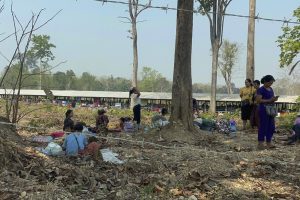Since the Myanmar military’s coup d’état on February 1, 2021, its commanders have led a full-on attack against the civilian population, systematically raping, killing, torturing, and arresting men, women, and children en masse. The illegitimate military junta, now calling itself the “State Administration Council” or SAC, has so far enjoyed complete impunity. The Government of Germany can help change that.
In January this year, the advocacy group Fortify Rights and 16 individual complainants from Myanmar, including myself, filed a criminal complaint with the Federal Public Prosecutor General of Germany against senior generals and others responsible for genocide, war crimes, and crimes against humanity in Myanmar. We could do so under the principle of “universal jurisdiction.”
What is universal jurisdiction? For states that have it, this unique legal principle enables access to justice for victims and survivors of the world’s worst crimes, regardless of where the crimes occurred.
As I write this, the crimes in my country are continuing unabated. In their desperate attempt to control a nation of more than 55 million people, junta soldiers have burned down civilian villages nationwide, displaced more than 1.5 million people, arrested over 17,000, and killed more than 3,000 civilians, including by enforcing the death penalty against pro-democracy activists. The opposition National Unity Government (NUG)’s Ministry of Human Rights recently documented that junta soldiers had killed 766 civilians in 64 massacres nationwide between July 2021 and March of this year.
On February 2, after marking the second-year commemoration of the military coup, the SAC declared martial law in 37 townships. Today, 50 out of Myanmar’s 330 townships are under martial law. While this is alarming in that it reflects the military junta’s decision to exercise martial law and court-martials against civilians, activists, human rights defenders, and journalists, it is also evidence of the military’s weakness. It can no longer control these townships, in addition to those already controlled by ethnic armed organizations, which have long had their own territories, administration, and services.
In response to the coup and the military’s heinous crimes, the people of Myanmar are fighting a revolution. Hundreds of People’s Defense Forces (PDFs), locally formed armed resistance groups, have been founded in various parts of Myanmar to defend unarmed civilians from the military’s terror campaign. On September 7, 2021, Duwa Lashi La, the acting president of the NUG, officially declared a “people’s defensive war” against the Myanmar military terrorists. It had no other option.
The Myanmar military’s history of committing human rights violations with impunity certainly predates the coup. Myanmar authorities have subjected Rohingya Muslim civilians to widespread and systematic human rights violations since the 1970s. In 2016 and 2017, the Myanmar Sit-Tat – or military – implemented a genocidal campaign against Rohingyas in northern Rakhine State, which it described as a military “clearance operation,” under the political cover and oversight of the elected civilian government of Aung San Suu Kyi (2016-2021).
The same military has committed war crimes and crimes against humanity in other ethnic states as well, and ethnic human rights organizations have long documented what is known as the military’s “four cuts” strategy to brutally prevent ethnic armed groups from accessing funding, food, intelligence, and recruits. The military junta still uses the strategy to this day against PDFs, ethnic armed organizations (EAOs) and, invariably, civilians.
According to Chin Human Rights Organization, Data for Myanmar, Fortify Rights, and Myanmar Witness, in recent months, the military junta has launched air strikes, shelling, and arson attacks against civilian cities and villages in Rakhine, Karenni, Karen, Kachin, and Chin states and the Sagaing, Magway, and Thanintharyi regions. My family and I personally survived such air strikes while evading attempts by the military to arrest and detain me for my human rights work. The individuals responsible for these attacks must be held accountable, or the attacks will not stop.
While governments worldwide have heeded the calls of the Myanmar people and implemented sanctions against the junta, not much else has happened. The international community is neglecting to do what is necessary to end the military’s attacks, let alone hold it accountable for its atrocities. The principle of “Never Again,” born out of the ashes of the Holocaust and German-led atrocities in World War II, should be an international norm and promise, but it’s sadly hollow. The global unwillingness to act against the perpetrators in Myanmar is only developing the dictatorship. In its report on January 25, the activist collective Justice for Myanmar exposed 60+ foreign governments and international organizations responsible for supporting the illegitimate military junta.
In the case of genocide, crimes against humanity, and war crimes committed by the Myanmar army, the international community must not support the junta and cannot remain neutral. If the international community and, most importantly, Myanmar’s neighbors in the Association of Southeast Asian Nations (ASEAN) appease the perpetrators, they grant them a stepping stone towards absolute impunity. That poses threats well beyond Myanmar’s borders.
Governments must take decisive action. U.N. member states should support all accountability initiatives to respond to the junta’s crimes. Specifically, governments should signal to the German authorities that they would support a German-led investigation into the crimes that we experienced in Myanmar. And they should support other universal jurisdiction initiatives aimed at ensuring justice for survivors in Myanmar – including ongoing efforts in Argentina, Turkey, and Indonesia.
Additionally, governments should do more to deny the junta access to revenue, weapons, and political legitimacy. The U.N. Security Council should have implemented a global arms embargo against the military years ago.
Meanwhile, I encourage other victims and survivors as well as perpetrators of genocide, crimes against humanity, and war crimes in Myanmar to come forward and share their accounts. Together, we must ensure the perpetrators of genocide, crimes against humanity, and war crimes no longer feel safe in this world and can no longer get away with their atrocity crimes. Together, we must make “never again” a reality.
































